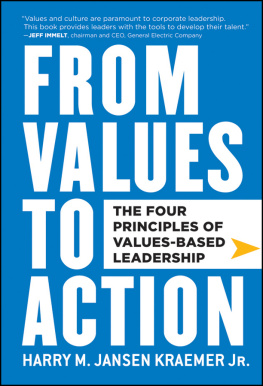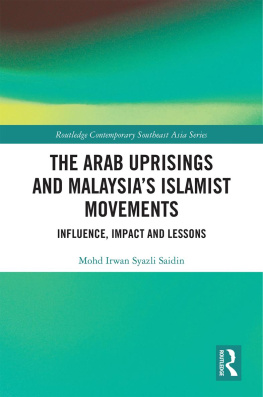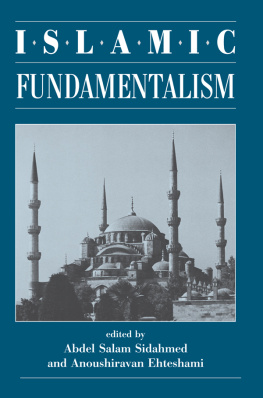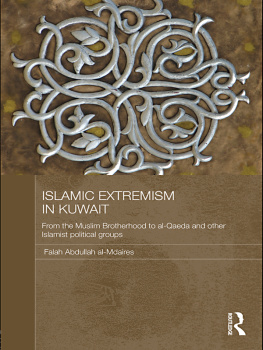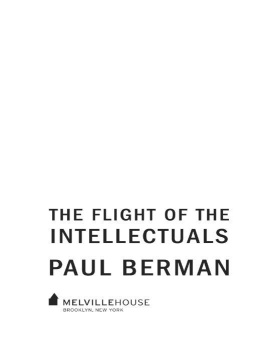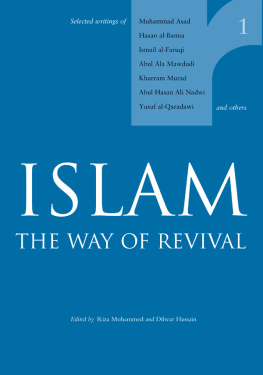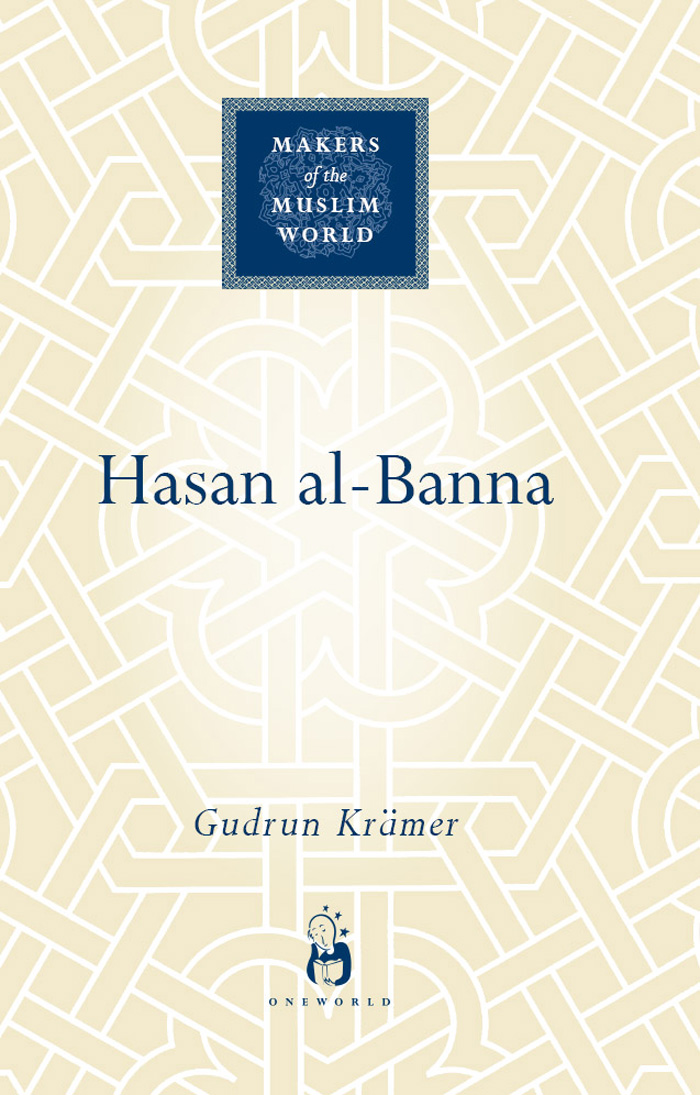
Hasan al-Banna
SELECTION OF TITLES IN THE MAKERS OF
THE MUSLIM WORLD SERIES
Series editor: Patricia Crone,
Institute for Advanced Study, Princeton
Abd al-Ghani al-Nabulusi, Samer Akkach
Abd al-Malik, Chase F. Robinson
Abd al-Rahman III, Maribel Fierro
Abu Nuwas, Philip Kennedy
Ahmad al-Mansur, Mercedes Garca-Arenal
Ahmad ibn Hanbal, Christopher Melchert
Ahmad Riza Khan Barelwi, Usha Sanyal
Akbar, Andr Wink
Al-Mamun, Michael Cooperson
Al-Mutanabbi, Margaret Larkin
Amir Khusraw, Sunil Sharma
Ashraf Ali Thanawi, Muhammad Qasim Zaman
Chinggis Khan, Michal Biran
El Hajj Beshir Agha, Jane Hathaway
Fazlallah Astarabadi and the Hurufis, Shazad Bashir
Ghazali, Eric Ormsby
Husain Ahmad Madani, Barbara Metcalf
Ibn Arabi, William C. Chittick
Ibn Fudi, Ahmad Dallal
Ikhwan al-Safa, Godefroid de Callatay
Karim Khan Zand, John R. Perry
Mehmed Ali, Khaled Fahmy
Mu awiya ibn abi Sufyan, R. Stephen Humphreys
Nasser, Joel Gordon
Sadi, Homa Katouzian
Shaykh Mufid, Tamima Bayhom-Daou
Usama ibn Munqidh, Paul M. Cobb
For current information and details of other books in the series, please visit www.oneworld-publications.com

Hasan al-Banna
GUDRUN KRMER

HASAN AL-BANNA
Published by Oneworld Publications 2010
This ebook edition published in 2013
Copyright Gudrun Krmer 2010
All rights reserved
Copyright under Berne Convention
A CIP record for this title is available from the British Library
ISBN 9781851684304
eISBN 9781780742120
Typeset by Jayvee, Trivandrum, India
Oneworld Publications
10 Bloomsbury Road
London WC1B 3SR
England
USA: 38 Greene Street, 4th Floor, New York, NY 10013, USA
www.oneworld-publications.com
Stay up to date with the latest books,
special offers, and exclusive content from
Oneworld with our monthly newsletter
Sign up on our website
www.oneworld-publications.com
CONTENTS
Introduction
1 FAMILY BACKGROUND, EDUCATION AND EARLY CAREER
Rural Piety
Early Education
Encountering Sufism
At Dar al-Ulum
The Impact of the Capital
2 THE SOCIETY OF THE MUSLIM BROTHERS: 192838
Planting the Seed in Ismailiyya
Contestation and Suspicion
The Move to Cairo
Building a Base
Recruitment and Activities
3 ENTERING THE POLITICAL STAGE: 193849
Looking Beyond Egypt
Going Political at Home
Preparing for Jihad: Rovers and Battalions
Patrons without Clients? The Muslim Brothers, the Palace and Party Politics
The SecondWorldWar and its Aftermath
Post-War Growth and Expansion
The Special Apparatus
Breakdown: 19489
4 HASAN AL-BANNA: THE PIVOT OF HIS UNIVERSE
Between Shaykh and Efendi: a Social Profile
Islam Applied: an Intellectual Profile
What Went Wrong?
The Means of Change
On Unity and Community
Islam as a System
A Moral Order, or Creating New Islamic Man
The Virtuous City
A Moral Economy
A Charismatic Community?
Concluding Remarks
Endnotes
Bibliography
Index
INTRODUCTION
H asan al-Banna (190649) was the founder and lifelong leader of the Egyptian Muslim Brotherhood, the largest and most influential Islamic movement in the Arab Middle East, formed in 1928 and still active in Egypt and other Muslim countries from Jordan and Yemen to Nigeria and Indonesia. Until Sayyid Qutb (190666), who only joined the Muslim Brotherhood after al-Bannas death, emerged, posthumously, as a powerful voice of modern Islamism, Hasan al-Banna embodied the Brotherhood as no other individual did. Even today, he continues to evoke strong feelings as reflected in a rich and varied literature, ranging from hagiography to angry polemic. Yet no scholarly biography has so far been published in either Arabic or any other relevant language. This may be due to the problematic nature of the sources as much as to the sensitivity of the subject that is, Islamism past and present. Not that there is a dearth of writings on the subject. The most widely read focus on a limited number of issues: Islam and power, Islam and gender and, of course, Islam, jihad and martyrdom. These issues are of obvious relevance to the present study, but they do not constitute its prime concerns. At the centre stands al-Bannas project of establishing a moral order based on what he conceived of as true Islam.
Hasan al-Bannas life and thought are so closely intertwined with the movement he founded and inspired that it is difficult to distinguish the private man from the public figure. For this reason, this study deals as much with the Muslim Brothers as with Hasan al-Banna himself, attempting to put them firmly in context. This sounds perhaps more trivial than it is. There is a tendency to treat Islamism as a subject located on a planet called Islam, different from all other socio-political and cultural phenomena. The Islamic exceptionalism resulting from this approach tends to underrate the commonalities of thought, idiom and practice between Islamists on the one hand and their secular contemporaries on the other. As a historian, one ought to try to counter this tendency.
Some technical remarks are called for. To illustrate al-Bannas thought, or discourse, I have quoted amply from his writings, notably his Memoirs, tracts and talks published in the Muslim Brothers press. Unfortunately, these texts have been repeatedly reissued, sometimes without indicating the publisher and the year of publication. A number of al-Bannas tracts are available in English translation. Whenever possible, I have referred to Charles Wendells Five Tracts of Hasan Al-Banna in addition to the original Arabic, taken from the collection of tracts Majmuat rasail, of which there exist several editions with different selections. My own translations are occasionally based on Wendells but depart from his whenever this seemed necessary. Footnotes are always a touchy subject: instructions for the Makers of the Muslim World series ask authors not to use any footnotes at all. Given the controversial nature of much of the material, I felt this was impossible. Some compromise had to be found. In the end, I decided to provide footnotes for statements, such as membership figures or the role of women in the Muslim Brotherhood, that I thought might be of interest to a wider readership or elicit debate. The main body of the narrative relies on what passes as Hasan al-Bannas Memoirs (Mudhakkirat al-dawa wa-l-daiya), the Letters edited by his brother Jamal, as well as a number of studies on the Muslim Brotherhood, notably R. Mitchell and Lia on the one hand, and Abd al-Halim, Ahmad, Mahmud, Shair, al-Sisi and Zaki on the other. Transliteration has been simplified so as to make the text readable while allowing the specialist to identify names, terms and titles. Al-Banna is written without the final hamza, which according to the rules of Arabic grammar it requires. However, the al-Banna family consistently spells its name without the hamza, and even as an orientalist, I saw no need to be as it were holier than the Pope, if this is a proper expression to use in the present context.


